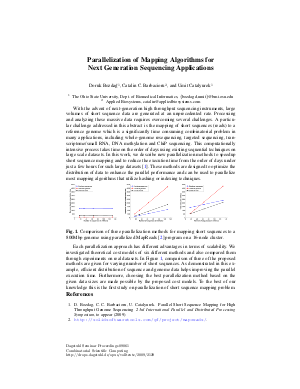Parallelization of Mapping Algorithms for Next Generation Sequencing Applications
Authors Doruk Bozdag, Catalin C. Barbacioru, Umit V. Catalyurek
-
Part of:
Volume:
Dagstuhl Seminar Proceedings, Volume 9061
Part of: Series: Dagstuhl Seminar Proceedings (DagSemProc) - License:
 Creative Commons Attribution 4.0 International license
Creative Commons Attribution 4.0 International license
- Publication Date: 2009-09-16
File

PDF
DagSemProc.09061.14.pdf
- Filesize: 132 kB
- 1 pages
Document Identifiers
Subject Classification
Keywords
- Genome sequencing
- sequence mapping
Metrics
- Access Statistics
-
Total Accesses (updated on a weekly basis)
0Document
0Metadata
Abstract
With the advent of next-generation high throughput sequencing instruments, large volumes of short sequence data are generated at an unprecedented rate. Processing and analyzing these massive data requires overcoming several challenges. A particular challenge addressed in this abstract is the mapping of short sequences (reads) to a reference genome by allowing mismatches. This is a significantly time consuming combinatorial problem in many applications including whole-genome resequencing, targeted sequencing, transcriptome/small RNA, DNA methylation and ChiP sequencing, and takes time on the order of days using existing sequential techniques on large scale datasets. In this work, we introduce six parallelization methods each having different scalability characteristics to speedup short sequence mapping. We also address an associated load balancing problem that involves grouping nodes of a tree from different levels. This problem arises due to a trade-off between computational cost and granularity while partitioning the workload. We comparatively present the proposed parallelization methods and give theoretical cost models for each of them. Experimental results on real datasets demonstrate the effectiveness of the methods and indicate that they are successful at reducing the execution time from the order of days to under just a few hours for large datasets. To the best of our knowledge this is the first study on parallelization of short sequence mapping problem.
Cite As Get BibTex
Doruk Bozdag, Catalin C. Barbacioru, and Umit V. Catalyurek. Parallelization of Mapping Algorithms for Next Generation Sequencing Applications. In Combinatorial Scientific Computing. Dagstuhl Seminar Proceedings, Volume 9061, p. 1, Schloss Dagstuhl – Leibniz-Zentrum für Informatik (2009)
https://doi.org/10.4230/DagSemProc.09061.14
BibTex
@InProceedings{bozdag_et_al:DagSemProc.09061.14,
author = {Bozdag, Doruk and Barbacioru, Catalin C. and Catalyurek, Umit V.},
title = {{Parallelization of Mapping Algorithms for Next Generation Sequencing Applications}},
booktitle = {Combinatorial Scientific Computing},
pages = {1--1},
series = {Dagstuhl Seminar Proceedings (DagSemProc)},
ISSN = {1862-4405},
year = {2009},
volume = {9061},
editor = {Uwe Naumann and Olaf Schenk and Horst D. Simon and Sivan Toledo},
publisher = {Schloss Dagstuhl -- Leibniz-Zentrum f{\"u}r Informatik},
address = {Dagstuhl, Germany},
URL = {https://drops.dagstuhl.de/entities/document/10.4230/DagSemProc.09061.14},
URN = {urn:nbn:de:0030-drops-21294},
doi = {10.4230/DagSemProc.09061.14},
annote = {Keywords: Genome sequencing, sequence mapping}
}
